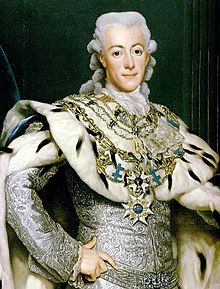Gustaf III
| Gustav III | |
|---|---|

Portrait by Alexander Roslin, 1777
|
|
| King of Sweden | |
| Reign | 12 February 1771 – 29 March 1792 |
| Coronation | 29 May 1772 |
| Predecessor | Adolf Frederick |
| Successor | Gustav IV Adolf |
| Born | 24 January 1746 , Sweden |
| Died | 29 March 1792 (aged 46) , Stockholm |
| Burial | 13 April 1792 Riddarholmen Church, Stockholm |
| Spouse | Sophia Magdalena of Denmark |
| Issue More... |
Gustav IV Adolf of Sweden Prince Carl Gustav, Duke of Småland |
| House | Holstein-Gottorp |
| Father | Adolf Frederick of Sweden |
| Mother | Louisa Ulrika of Prussia |
| Religion | Lutheran |
|
Styles of Gustav III of Sweden |
|
|---|---|
 |
|
| Reference style | His Majesty |
| Spoken style | Your Majesty |
| Alternative style | Ers Majestät |
Gustav III (24 January [O.S. 13 January] 1746 – 29 March 1792 ) was King of Sweden from 1771 until his assassination in 1792. He was the eldest son of King Adolf Frederick of Sweden and Queen Louise Ulrika (a sister of King Frederick the Great of Prussia), and a first cousin of Empress Catherine the Great of Russia by reason of their common descent from Christian August of Holstein-Gottorp, Prince of Eutin, and his wife Albertina Frederica of Baden-Durlach.
Gustav was a vocal opponent of what he saw as the abuse of political privileges seized by the nobility since the death of King Charles XII. Seizing power from the government in a coup d'état in 1772 that ended the Age of Liberty, he initiated a campaign to restore royal , which was completed by the Union and Security Act of 1789, which swept away most of the powers once exercised by the Swedish Riksdag (parliament). A bulwark of enlightened despotism, Gustav spent considerable public funds on cultural ventures, which were controversial among his critics, as well as military attempts to seize Norway with Russian aid, then a series of attempts to re-capture the Swedish Baltic dominions lost during the Great Northern War through the failed war with Russia. Nonetheless, his successful leadership in the Battle of Svensksund averted a complete military defeat and signified that Swedish military might was to be countenanced.
...
Wikipedia
